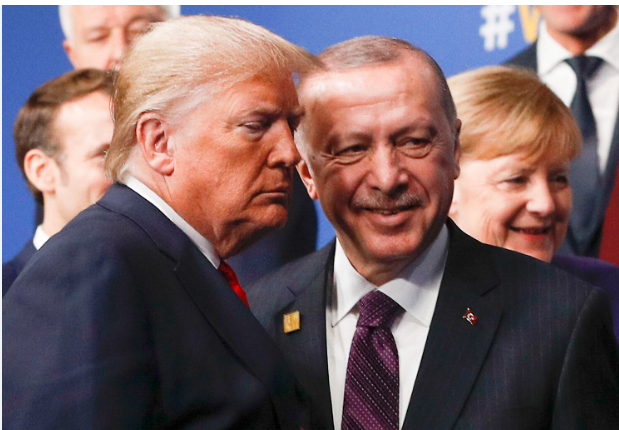Irrespective of who will take the Oval Office in the upcoming U.S. Presidential elections, the Israeli-Palestinian conflict, Assad, and the SDF will continue to be the most significant issues between Turkey and the United States in the Middle East. Significant disputes regarding Gaza and the SDF will continue to recur for another four years under the Biden administration. In this case, an overall cold approach to Turkey in the region can be expected, narrowing the pathways for Turkish mediation in the war Ali Mammadov and Ricardo Gasco in National Interest.
Yet, the strong friendship forged between Trump and Erdogan suggests that problems in other areas, such as S-400s and the Halkbank Iran sanctions violations trial may be easier to overcome. Recently, Turkish Foreign Minister Hakan Fidan promised a “new page” in the troubled relationship, which demonstrates Ankara’s desire to balance her growing dependency on Russia with tighter relations with US.
A potential Trump victory in the November elections may have only a minor impact on relations. Despite Trump’s harsh criticism of the Netanyahu government, the United States is likely to continue its historical support for Israel under Trump as well. As a result, disagreements between the United States and Turkey over this issue will likely continue. However, the Trump administration’s occasional isolationist tendencies may lead to a desire to end the armed conflict sooner, even if this is not entirely beneficial to Israel.
Given the previously proposed Trump Peace Deal, the agreement will also be far from perfect for Palestinians. As a result, Trump may be more inclined to absolve the United States of the responsibility for coordinating the Gaza conflict by reaching a regional agreement with mediatory powers like Turkey. Given the precedent, Trump is more likely to reach a compromise on Turkey’s fight against the SDF, too. Nonetheless, the potential compromises and middle grounds do not mean anything yet. Given the overall unpredictability of Trump’s foreign policy, relations between the United States and Turkey will likely display a certain level of instability throughout the region if Trump wins the elections.
It is easy to conclude that over the past years, as Turkey-U.S. relations deteriorated, Turkey’s relations with Russia were improving and strengthening. However, the reality is more complex and involves a detailed engineering of managing the rivalry between Turkey and Russia at a regional level and an alignment on strategic issues between Turkey, the United States, and NATO. Turkey is increasingly keen on diversifying its relationships, especially economically, to support the state’s fragile finances while remaining firmly within a security architecture from which it plays a central role and can benefit. The scenarios that could unfold with a change of presidency in the United States would bring new challenges to the relations between the two countries with two potential outcomes. On the one hand, if the United States continues on a path of reduced commitment to defending Western allies, this could give rise to new forms of cooperation and the emergence of an enhanced security architecture between Europe and Turkey.
On the other hand, Turkey might look at a new Trump Presidency positively as it can increase cooperation at the leadership level, making it easier to address some of the long-standing issues with Trump. Particularly in Middle Eastern affairs, Turkey could find common ground more easily with the Trump administration. Regarding NATO or Russia-related issues, the Biden administration might be more effective in working with them. The level of cooperation will be determined depending on the administration’s priorities in foreign policy. Whether pragmatism will win over dependency is yet to be seen.
A Trump presidency can improve the bilateral relationship in ways not mentioned by Mammadov and Gasco. The White House has re-invited Turkey to F-35 jet fighter program with the proviso that the latter abandons Russian-made S-400s. While the modalities of how Turkey can get rid of S-400s is not articulated, one possible solution will be turning over the supervision of the anti-missile system to a NATO officer, to ensure that it is not activated. Turkey has so far refused the debate the fate of S-400s, but Erdogan will find it much easier to solve this controversy with his pal Trump.
The trial of state-owned commercial lender Halkbank is still languishing in a New York appellate court, which is considering a motion to dismiss it. If it rejects the please, the trial could possibly result in the conviction of Halkbank for being an accessory to money laundering on behalf of pro-Iranian agents, which would attract huge penalties for the bank, possibly bankrupting it. While the Trump presidency doesn’t have the authority to meddle in the court proceedings, it will be up to the State Department to negotiate the implementation of the penalty, where Turkey will get some slack.
Finally, financial investors may re-visit Turkey as the political relations between two countries improve. After devastating losses in Russia and now China, financial investors are an eager as “friend-shore” their investments as non-financial multinationals.
The National Interest, PA Turkey staff
Follow our English language YouTube videos @ REAL TURKEY: https://www.youtube.com/channel/UCKpFJB4GFiNkhmpVZQ_d9Rg
And content at Twitter: @AtillaEng
Facebook: Real Turkey Channel: https://www.facebook.com/realturkeychannel/
